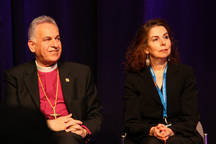The Episcopal Church Office of Public Affairs reports that following the meeting of the Episcopal Church House of Bishops March 25 – 30, two letters were issued: a letter from Presiding Bishop Katharine Jefferts Schori to the Church; and a letter from the House of Bishops to the Israeli ambassadors to the nations where the Episcopal Church has dioceses or presence. The letters call for resolution of the denial of “Temporary Residency Status” for The Rt. Rev. Suheil Dawani, Anglican Bishop of the Episcopal Diocese of Jerusalem.

Diocese of Jerusalem Bishop Suheil Dawani and his wife, Shafeeqa, at the 2010 General Synod of the Anglican Church of Canada. Photo: General Synod Communications
The following are the two letters:
To the members of The Episcopal Church
From the House of Bishops:
At our meeting in Kanuga, North Carolina, 25-30 March 2011, we considered the plight of our fellow Christians in the land of the Holy One. Bishop Suheil Dawani, of the Diocese of Jerusalem, has for many months been gravely limited in his ability to function as leader of that diocese. We urge your reflection on the following letter, and your response as you deem most appropriate. Change is likeliest when the leaders of our governments know of our urgent concern.
In every part of The Episcopal Church, your response is most likely to be effective when directed to Israel’s ambassador to your nation, to your national leader – President and/or Prime Minister, and/or to your legislative representatives in your national government.
In the dioceses of The Episcopal Church within the United States, those contacts are:
Ambassador Oren: embsec@washington.mfa.gov.il
President Obama: http://www.whitehouse.gov/contact
House of Representatives: https://writerep.house.gov/writerep/welcome.shtml
Senate: http://senate.gov/general/contact_information/senators_cfm.cfm
In the dioceses of The Episcopal Church beyond the United States, we urge you to work with your diocesan bishop if you are uncertain about how to contact the Israeli Ambassador, your President or Prime Minister, and your legislators.
May God bless the land of the Holy One with peace. I remain
Your servant in Christ,
The Most Rev. Katharine Jefferts Schori
Presiding Bishop and Primate
The Episcopal Church
_________________________________________________________________
A letter from the House of Bishops of The Episcopal Church to the Israeli ambassadors to the nations where The Episcopal Church has dioceses or presence
30 March 2011
It is with deep concern that we inform you that the Anglican Bishop of the Episcopal Diocese of Jerusalem, the Rt. Rev. Suheil Dawani, has been denied renewal of his “Temporary Residency Status” in Jerusalem. This action was taken when the A-5 permits held by the bishop, his wife, and youngest daughter were revoked by the Government of Israel, effective 24 September 2010.
The Government of Israel claims that the permits were denied because of an accusation by the Ministry of the Interior that Bishop Suheil acted with the Palestinian Authority in transferring land owned by Jewish people to the Palestinians, and also helped to register lands of Jewish people in the name of the Church. There were further allegations that documents were forged by the bishop.
Bishop Dawani has vehemently denied these allegations and responded formally to the Ministry of the Interior. He has never received a response. The bishop also sent a letter challenging the allegations and demanding that any evidence to secure the claim against him be made known to him. To date no information has been forthcoming.
The Archbishop of Canterbury received assurances that the situation would be resolved promptly. Other Anglican leaders including Presiding Bishop Katharine Jefferts Schori, the Episcopal Bishop of Washington D.C. (the Rt. Rev. John B. Chane), and the Primates of the Anglican Communion, representing Anglicans throughout the world, have all used their influence individually and collectively with Israeli authorities, without success to date.
Diplomatic efforts through the British Foreign Secretary, the British Ambassador to Israel, the British Consul General in Jerusalem, the State Department of the United States, and the American Consul General in Jerusalem, and Christian and Jewish leaders in Jerusalem have all provided support for Bishop Dawani in his ongoing contact with Israeli authorities, but without tangible results. In terms of discovering the source of the allegations against the bishop, or the restoration of the residency rights which are crucial to his ability to provide leadership of his diocese, and residency in Jerusalem for himself and his family, the Israeli Government has failed to respond. Because of the current situation the bishop is unable to conduct any legal business on behalf of the diocese, and is crippled in his ability to run the day to day affairs of his diocese, which comprises schools, churches, and hospitals in Israel, the West Bank and occupied territories, Gaza, Jordan, Syria, and Lebanon.
We seek your assistance in resolving this situation as rapidly and completely as possible. The ability of our brother, Bishop Dawani, to lead his diocese is severely compromised. We ask your urgent attention to this matter.
Sincerely,
The bishops of The Episcopal Church, in 110 dioceses and two regional areas in Austria, Belgium, Colombia, Dominican Republic, Ecuador, Federated States of Micronesia, France, Germany, Haiti, Honduras, Italy, Switzerland, Taiwan, Venezuela, and the United States of America (including Guam and Puerto Rico), and the British and U.S. Virgin Islands




